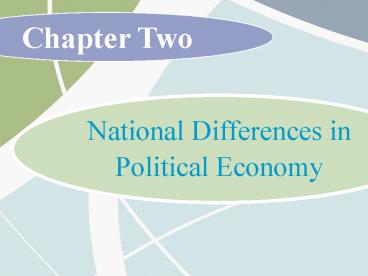National Differences in Political Economy PowerPoint PPT Presentation
1 / 21
Title: National Differences in Political Economy
1
Chapter Two
- National Differences in Political Economy
2
Political Economy
- A term that stresses that the political,
economic, and legal systems of a country are
interdependent they interact and influence each
other, and in doing so they affect the level of
economic well-being
3
Political Systems
- System of government in a nation
- Political systems can be assessed according to
two dimensions - Degree to which they emphasize collectivism as
opposed to individualism - Degree to which they are democratic or
totalitarian
4
Collectivism and Individualism
- Collectivism
- Collective goals are more important than
individual goals - Individual rights are sacrificed for the good of
the majority - In the modern world collectivism is expressed
through socialism
- Individualism
- Is the direct opposite of collectivism
- Central tenet is that individual economic and
political freedoms are the ground rules on which
society is based
5
Democracy versus totalitarianism
- Democracy
- Government is by the people, exercised either
directly or through elected representatives
(representative democracy) - Elected representatives are held accountable
through safeguards
- Totalitarianism
- One person/party exercises absolute control over
all spheres of human life (competing political
parties are banned) - Communist totalitarianism
- Theocratic totalitarianism
- Tribal totalitarianism
- Right wing totalitarianism
6
Economic Systems
- Connection between political ideology and
economic systems - Countries where individual goals are given
primacy free market economic systems are fostered - Countries where collective goals are given
primacy there is marked state control of markets
7
Economic Systems
- Market economy what is produced in what
quantity is determined by supply/demand and
signaled to producers through a price system - Command economy planned by government
- Mixed economy a balance of both of the above
8
Legal Systems
- Rules - laws - that regulate behavior
- Processes through which laws are enforced
grievances are redressed - Three main types of legal systems in use around
the world - Common law
- Civil law
- Theocratic law
9
Contract Law
- Contract law is the body of law that enforces a
contract - Specifies conditions under which an exchange is
to occur - Details rights and obligations of parties
- Dispute resolution is often complex
- Where to arbitrate and whose laws apply?
- Validity of contracts and decisions
- Role of United Nations Convention on Contracts
for the International Sale of Goods (CIGS)
10
Property Rights
- A bundle of legal rights over the use to which a
resource is put and over the use made of any
income from that resource - Can be violated through
- Private action
- Public action and corruption
11
Corruption as of 2004
12
Foreign Corrupt Practices Act
- The act was passed during the 1970s following
revelations that U.S. companies had bribed
government officials in foreign countries in an
attempt to win lucrative contracts - This law makes it illegal to bribe a foreign
government official in order to obtain or
maintain business - The act allows facilitating or expediting
payments to secure the performance of a routine
governmental action
13
Intellectual Property Rights
- Intellectual property refers to property that is
the product of intellectual activity - Intellectual property laws are a very important
stimulus to innovation and creative work - Protection of intellectual property rights
differs greatly from country to country
14
Piracy of Intellectual Property
15
Differences in Economic Development
- Different countries have dramatically different
levels of economic development - Two common measurements of economic development
- Gross National Income (GNI) superseded Gross
National Product or GNP - Purchasing Power Parity (PPP) which accounts for
differences in the cost of living
16
Differences in Economic Development Purchasing
Power Parity
17
Political Economy and Economic Progress
- It has been argued that a countrys economic
development is a function of its economic and
political systems - Generalizations regarding the nature of the
relationship between political economy and
economic progress - Innovation and Entrepreneurship are the engines
of growth - Innovation and Entrepreneurship require a market
economy - Innovation and Entrepreneurship require strong
property rights - The required political system is in place
- Economic progress begets democracy
18
Socialism
Socialist ideology is split into 2 broad camps
- Communism
- Communists believe that socialism can only be
achieved through violent revolution and
totalitarian dictatorship
- Social Democracy
- Marxist roots. State owned enterprises run for
public good rather than private profit
Return
19
Communist Totalitarianism
- Advocates that socialism can be achieved only
through totalitarian dictatorship - Has been in decline worldwide since 1989
- Communist Totalitarian states deny many basic
civil liberties to their populations - Exceptions to this trend are China, Vietnam,
Laos, North Korea, and Cuba
Return
20
Theocratic Totalitarianism
- Found in states where political power is
monopolized by a party, group, or individual that
governs according to religious principles - Most common form of theocratic totalitarianism is
based on Islam - State limits freedom of political and religious
expression while the laws of the state are based
on Islamic principles
Return
21
Right Wing Totalitarianism
- Generally permits some individual economic
freedom but restricts individual political
freedom, frequently on the grounds that it would
lead to the rise of communism - Many right-wing totalitarian governments are
backed by the military, and in some cases the
government may be made up of military officers - Since the early 1980s this form of government has
been in retreat
Return

